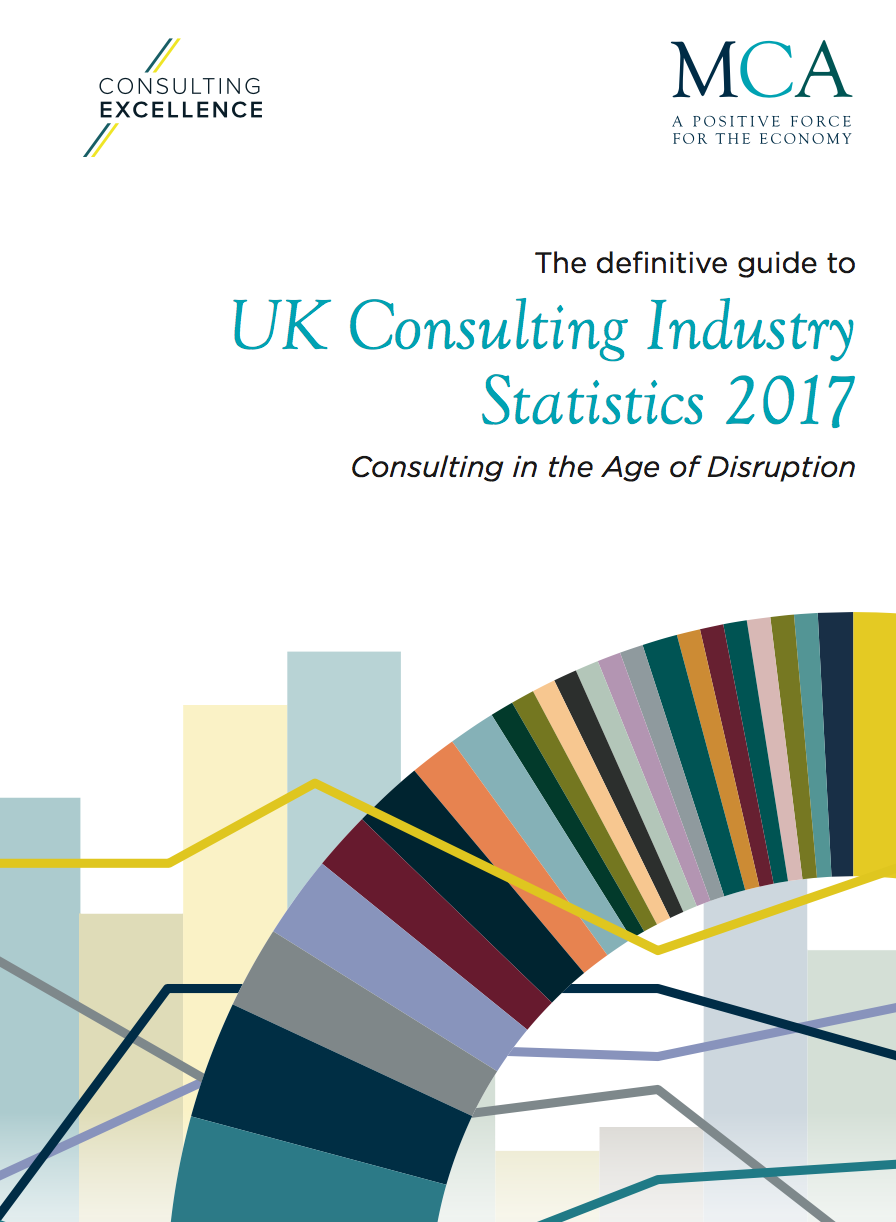
- MCA report highlights digital disruption to consulting industry and wider economy
- Report warns of possible recession
- MCA criticises Government’s approach to Brexit
- Report points to lack of serious public sector reform agenda
In its Annual Report 2017, published today, the MCA (Management Consultancies Association) examines the revolutionary changes impacting the consulting industry and its clients.
The Report is the definitive analysis of around 50% of the fee income of the UK consulting industry, a sample of around £4.46bn in size. The sample includes PwC, Deloitte, KPMG and IBM, as well as many big consulting practices in technology and infrastructure firms, and specialist consulting practices.
The data reveals that in 2016, the UK’s world leading consulting industry saw a 4.76% growth in fee-income. Niche specialist firms grew substantially faster than any other type (20%) including pure consulting firms and audit firms. While the large firms have the largest share of consulting revenues (78%), they grew by 4% while medium-sized firms grew by 6%.
The MCA analysis shows that the growth of niche specialists and the success of some medium-sized consulting practices is attributable to specialisation and differentiation in response to client demands for expertise.
The report also shows how consulting firms are digitising not just in response to client demands, but also in their own operations. Digital consulting remains the largest area of specialised consulting advisory at 28%. Consultants remain at the heart of the digital value chain, providing advice on AI, data analytics, automation, the Internet of Things and ‘disruptive’ techniques right across sectors. Indeed, the data shows that consultants provide substantial amounts of digital advice to digital and technology companies, revealing that their insights are regarded as cutting edge even by the experts.
This emphasis on digital is linked to growth in other consulting disciplines. Operations consulting is now the second largest area of consulting advice. Firms want to transform their operating models in response to the digital challenge. Similar needs are sustaining high demand for human capital advisory, as digital changes firms’ skills needs.
Digital is also changing consulting offers. More consulting firms are deploying automation in their analytics, offering bespoke Cloud-based consulting services, and putting new techniques such as crowdsourcing at the heart of their offers. This is having a beneficial impact on consulting productivity. Fees per consultant rose by £10k in 2016. The growth in consulting recruitment by contrast slowed considerably, indicating that some larger firms in particular are exploring ways to break the link between growth in consulting numbers and income growth.
MCA Chief Executive, Alan Leaman, says the diversifying nature of consulting is a positive development. “In the increasingly disrupted business landscape, firms need highly specialised advisers. They also have complex needs that cannot always be met by any one advisory practice. MCA member firms are differentiating and becoming more specialised. But they are also collaborating with each other to provide client value. Often operating ‘at risk’ and being paid for the outcomes they achieve, they are reinventing themselves in order to help their clients reinvent and rise to the challenge of the disrupted digital economy.”
Consulting continues to operate in important UK sectors. Financial services, a sector of huge strategic significance, retains the largest share of consulting fee income at 29%. Consulting activity in retail and leisure, where the UK is a leading centre of innovation, grew by 24%. Consulting also remained strong in energy and resources and grew for the second year running in its contribution to private health and life sciences.
However, there are issues in the data set of potential concern for policymakers. The 4.76% headline growth figure for consulting is far lower than in previous years and is closer to the trend growth for the economy. This suggests that businesses, which are experiencing a slowing of headline growth, are deferring growth-supporting projects and cutting back on discretionary spend. Interviewees for the Report suggest this challenge is intensifying in 2017.
Report author, MCA Deputy Chief Executive and Think Tank Director Paul Connolly, says this is a troubling sign.
“Consulting is historically a both a lagging and an anticipatory indicator of economic recession and growth. In the aftermath of the Financial Crisis, the economy went into deep and protracted recession. Consulting’s own recession was delayed. As economic output fell firms still needed consultants to help them restructure. Then, when they could no longer afford this, consulting went into a very deep recession indeed. Then in the early part of this decade, before the wider economy returned to consistent growth, firms started to hire consultants to help them gear up for growth. They started to examine new sales propositions and products, and to rise to the challenge of the Digital Revolution, which had continued apace, even as the wider economy had stalled. As the economy started to grow, the consulting industry outpaced that growth by around 5%. Now consulting growth, though welcome, is substantially down on the 8% of 2014 and 2015. This suggests that businesses are becoming more bearish.
“Unless policymakers respond boldly to this caution, there is a real danger of recession. There are other troubling signs. The scale of private indebtedness is worryingly similar to the position prior to the Financial Crisis. The UK has a productivity crisis. In common with the rest of the world it faces the major challenge of integrating the potential of AI, automation and other digital ‘disruptors’ into its industrial model. But the key area on which policymakers must provide clarity is Brexit.”
Theresa May’s Florence speech, delivered as the MCA’s report went to press, does not, in Connolly’s view, provide that clarity. “A transition period was always going to be necessary, but we are no clearer on the basic question: transition to what? The ultimate shape and character of Brexit remain unclear.”
The report cites MCA member concerns about the lack of clarity over the Government’s aims for Brexit. UK management consulting is a global industry. The Report reveals that 25% of UK consulting revenues come from overseas sales, around half of that from the EU. Around 17% of staff in MCA firms are migrant workers, with 9% coming from EU countries.
Alan Leaman argues that the success of consulting and the wider economy are linked to a smooth Brexit. “Consulting is at the heart of an extremely important feature of modern capitalism. Value and supply chains in everything from automotive, infrastructure, energy and digital are global. A UK SME may provide components for German cars or a technical innovation for a French bank. Management consultants are critical to these value chains. They integrate them and provide specialised advice and support on everything from digital to the management of complex infrastructure projects to many firms working in the global contexts that are vital to the UK’s export success. Our industry needs open markets to continue to provide this value.
“It also needs free movement of labour. Firms based in the UK rightly want access to the very best insights. The ability of our industry to marshal teams of experts from across the globe to answer their demands is a great strength. It needs to be protected.” The Report is accordingly critical of recent suggestions of a ‘Fortress Britain’ approach to border control being developed by the Home Office.
To face the combined challenges of Brexit, decelerating growth, and the disruptive potential of digital, the Report suggests that the UK needs a much more radical approach to economic reform than the one set out in the Government’s Industrial Strategy Green Paper. The authors recommend radical devolution of political and economic power to the UK regions, a comprehensive overhaul of the education system, and wholesale digitisation.
The Report is also critical of the absence of a clear Government blueprint for public service reform.
Consulting in the public sector grew modestly in 2016 (4.6%) but the aggregate fee income has stabilised at a figure well down on its historic high of the previous decade. Defence is the largest area of consulting activity. While there was modest growth in local government consulting, health spending fell in real terms.
The authors suggest that the continued management of public spending reductions needs to be coupled to a vision of the future dimensions and role of the public sector. Government should also set out how the best outcomes for citizens can be achieved through a rational mix of in-house and contracted provision.
Alan Leaman argues that consulting should play an important role in the UK’s post-Brexit future. “Provided the UK can avoid recession and achieve a smooth transition to the post-Brexit industrial and trading model, then they will continue to be at the heart of the UK’s success.”
The report is free to MCA members, and can be purchased by non-members and clients here.
A public summary version of the report is also available to download for free.
The dataset is only avaliable to MCA members.
-ENDS-
Notes to Editors:
- The MCA is the representative industry body for UK management consulting firms. The MCA’s member companies comprise over 50 per cent of the UK consulting industry in fee income, employ around 45,000 consultants and work with over 90 of the top FTSE 100 companies and almost all parts of the public sector. All members adhere to the MCA Code of Practice that provides the consultancy buyer with reassurance that MCA firms maintain the highest standards.
- The MCA’s Annual Report is unique. It is based on an analysis of the detailed returns from member firms, as well as a number of other contributors. These firms represent around 50% of the total UK consulting industry. Given the nature of the information member firms provide, this is an analysis unrivalled in breadth, detail and authority.
Fee income is defined as the money spent by clients in a sector to purchase a particular advisory capability.

